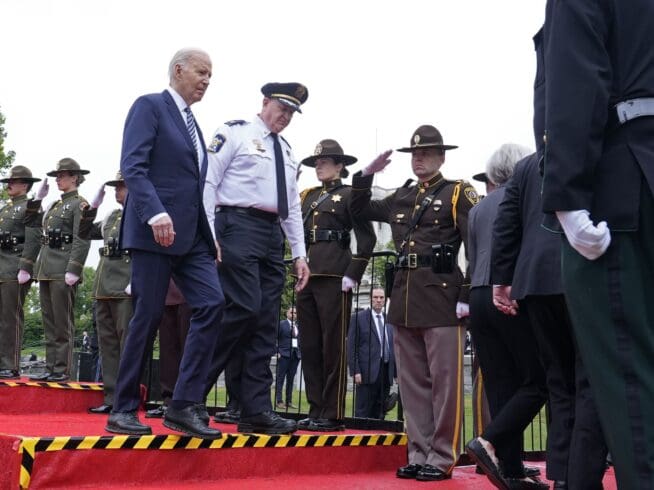New gun safety laws go into effect as MSU marks anniversary of shooting
The new laws expand background checks and conviction-related ownership restrictions, require safe storage, and allow judges to issue ‘red flag’ protection orders prohibiting gun possession.

On the steps of the Michigan Capitol on Feb. 15, tears flowed as Maya Manuel, a student at Michigan State University, described what it means to live through a mass shooting.
Expressing the grief, anger and empathy that come with a tragedy like the one that occurred on MSU’s campus just one year before remains a tiresome and ongoing challenge, Manuel said. She feels it’s necessary, though, to use her pain to continue to push for policies that can prevent more innocent lives from being lost to gun violence.
“I am exhausted. I’m truly exhausted,” Manuel said. “But it is worth every law. It is worth every life and every reality that we will change.”
Members of the Spartan community rallied at the state Capitol to commemorate the anniversary of the mass shooting on MSU’s campus in East Lansing and remember the lives that were lost.
On Feb. 13, 2023, a gunman killed MSU students Arielle Anderson, 19, Alexandria Verner, 20, and Brian Fraser, 20, and injured five others. A few hours later, police found the gunman off campus, dead of an apparent self-inflicted gunshot wound.
In the days after the shooting, MSU students flocked to the Capitol, protesting the state’s lax gun laws and pleading with lawmakers to take action to reform them. Soon after, the Legislature’s Democratic majority introduced and passed a comprehensive package of gun reform bills. Democratic Gov. Gretchen Whitmer signed the legislation into law on April 13, 2023, at Spartan Stadium, but the laws didn’t go into effect until this month, on the first anniversary of the shooting.
The new laws expand background checks, require safe storage, and allow judges to issue “red flag” protection orders prohibiting gun possession by people officially determined to be a threat to themselves or to others. Democratic legislators had actually proposed the bills after the 2021 Oxford High School shooting, which left four dead and seven injured, although they received little traction at the time in the Republican-dominated Legislature.
“Once we won the majority, we knew we were going to be able to pass these laws. So our plan was to get it ready as quickly as we could, try to get the packages through the Senate,” said Democratic state Sen. Rosemary Bayer, who represented Oxford, according to the Associated Press. “Then Michigan State happened, and the governor just looked at us and said, ‘I want to do it right now.’”
A separate bill increasing the length of the ban on gun possession after a domestic violence conviction passed separately. All four laws took effect Feb. 13.
Michigan Attorney General Dana Nessel said in a statement that the new laws are an important step forward.
“When our neighbors, our friends, our children are dying by firearms at ever-increasing rates, we need to be doing much more and I am proud of the steps Michigan has taken to answer that call,” Nessel said. “I pledged to do more than just offer thoughts and prayers in response to the tragedies that occurred at MSU and Oxford High School. My department worked closely with Governor Whitmer and the Michigan legislature to fulfill that promise, resulting in the gun safety laws that take effect today.”
The laws create multiple avenues for preventing future shootings.
The “red flag” law allows family members, mental health workers, law enforcement and others to ask a judge to order firearms be removed from the possession of people they believe pose a risk of carrying out gun violence. The safe storage law requires gun owners to safely lock up their weapons and ammunition when minors are present.
“While this is tremendous progress, our work here is not done, and we must all commit, today and every day, to continue the work we started in addressing this crisis,” Nessel said.
Jo Kovach was the student body president at Michigan State last year and now advocates for gun safety reform with Students Demand Action and Everytown for Gun Safety. Kovach echoed Nessel’s remarks: The new laws can change lives, but the work can’t stop until no more lives are lost to gun violence.
“When shoot first or ‘stand your ground’ laws are still on the books that take an additional 150 people a year on average, there’s work to be done. When guns can be openly carried into sensitive spaces to intimidate others, like at the Capitol or at a demonstration, there’s work to be done,” Kovach said. “As long as there are not strict laws in place, mass funding for social services to prevent violence of communities historically ravaged by firearms, and as long as guns can still make it into the wrong hands, there’s still work to be done.”




